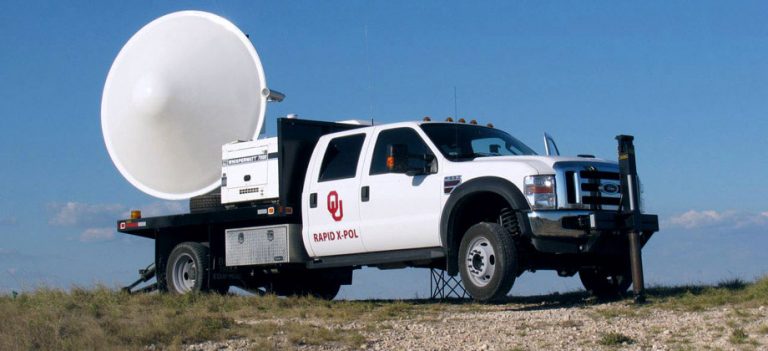
A strange and unique vehicle can be seen around North Florida and the UF campus in September. It’s the Rapid X-band Polarimetric Radar, or RaXPol. The vehicle was built and continues to be operated by the Advanced Radar Research Center (ARRC) at the University of Oklahoma (OU).
Radar data you may have seen on a website or phone application is collected by radar instruments located on top of permanent towers. Instead, this radar is placed on the back of a truck, which is why it’s commonly called either a “radar truck” or “mobile radar.” By placing the instrument on the back of a vehicle, it can be transported to a storm so data can be collected from closer distance. RaXPol is one of only 18 mobile radars currently operating in the world.
RaXPol is coming to Florida to support a collaborative effort between researchers and students from the University of Florida and the University of Oklahoma. Professors Dr. Berry Wen from UF Geography and Dr. Tian-You Yu and Dr. David Bodine from OU ARRC are leading the effort, with support from faculty and students from both institutions.
Short Course Series
Upon arrival, RaXPol will be used to teach important skills of planning and executing mobile radar research experiments. A series of short courses will be presented at the UF Geography department and streamed live to students at other institutions and on the UF Geography YouTube channel. Live demonstrations of the instrument will be given on the Reitz Union North Lawn near The Hub and the Marston Science Library.
Recorded Lectures
Radar fundamentals and system overview
Radar experiment design and radar applications
Soon: Demonstration of RaXPol itself
Thursday, September 15
9:50am – Viewing RaXPol data with radarhub, Turlington 3006
4:00pm – Department of Geography Colloquium, Turlington 3018
Saturday, September 17
10:00am – Visit RaXPol in front of the Florida Museum of Natural History.
Tuesday, September 20
9:35am – Deploying RaXPol in an experiment, Turlington 3006
In addition, RaXPol will be traveling to Kimball Wiles Elementary School, Buchholz High School, and Oak Hall School to let students see and learn about this unique vehicle.
RaXPol Research Experiments
In addition to the courses, RaXPol will be used between September 14th and 23rd to study the Florida sea breeze that generates most of the state’s daily summer storms. A virtual workshop was held on August 24 for students and scientists to brainstorm science topics, deployment locations, and experimental strategies.
Each day during the campaign, students and scientists will lead weather briefings, determine deployment locations and scanning strategies, and operate the radar remotely.

Collaborators from UF Geography for this two-week event include Dr. Berry Wen, Ali Alruzuq, Dr. Esther Mullens, Megan Borowski, and Stephen Mullens. Collaborators from OU’s ARRC include Dr. David Bodine, Dr. Tian-You Yu, Dr. Pierre Kirstetter, Min-Duan Tzeng, Dr. Yagmur Derin, Laura Shedd, and Brendon Cohen.